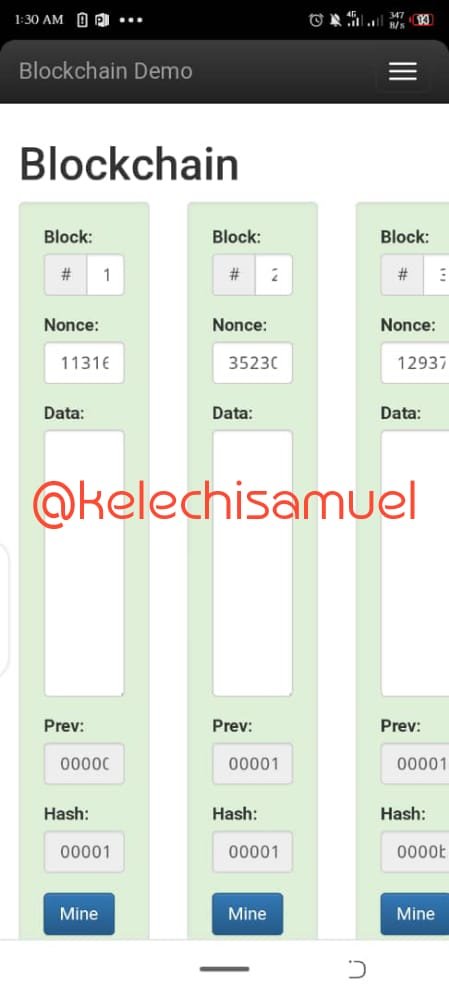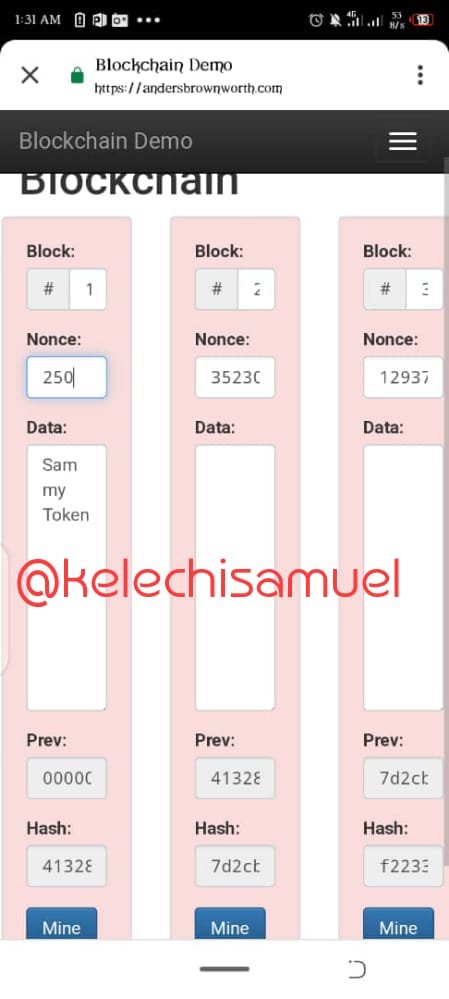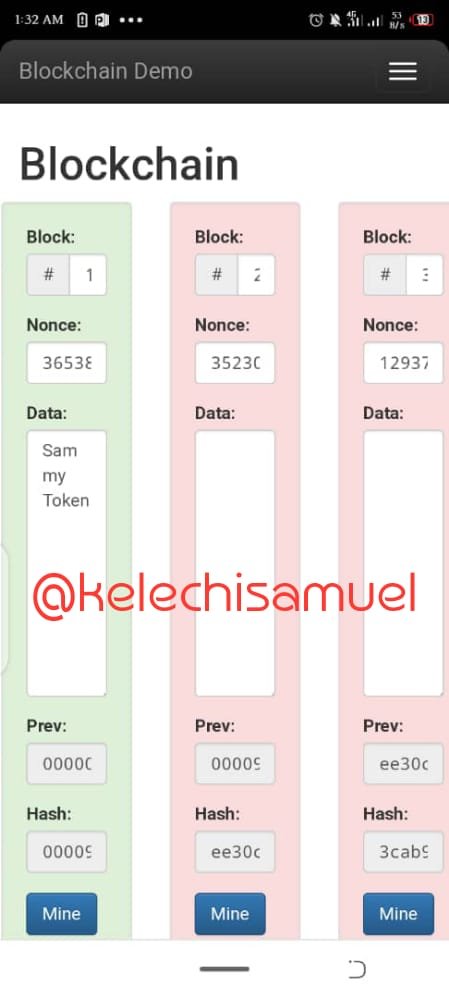Crypto Academy / Season 3 / Week 6 - Homework Post for [ @stream4u ] Let's Open The Blockchain.
Blockchains, could be seen as the entirety of today's lesson, well explained even together with its scope, types, functions, the hash and more. I hope, to use this assignment to express my understanding of the light flooded on this topic by the lesson.

What is Blockchain and What are the types of Blockchains / Explain in detail the types of Blockchain?
"A blockchain basically depicts, a decentralized digital ledger /record of transactions that is recreated and spread over the total networks of crypto computer softwares."
This blockchain entails a pattern of records, being kept of transactions, in a way that keeps it hard to get through maliciously or hacked. We've further seen this , as a connection system for several chains of blocks (software/files about the) platform that that work together to execute protocols on the network
The concept of blockchains are better revealed as, transactions occur and records are taken on the block, this blockchain makes it possible to be added to the ledger of all participants
The Blockchain further more, has four major types, including :
The Public Blockchain : This blockchain could be seen as the origin of blockchains that brought the Distributed Ledger Technology (DLT) to limelight and provided solutions to weak security and transparency. This DLT, debentralised the software and shared information on peer to peer networks instead of leaving it in a singular place.
It also confirmed, data quality by having all its users accept the present state of the ledger while having the Pow and PoS as its major patterns of reaching the agreements. Users, are granted liberty to sign into the blockchain anytime and could easily become an authorized node with the network being easy going to use.
Risks too are involved in this network since it could be relatively slow some periods and malicious individuals could hack into it with more than 50% of consensus powerPrivate Blockchain :The private blockchain could be tagged to be a bit different from the former, as they tend to work under covered networks and manipulated by one person. It's difference from the public blockchain majorly is based on the fact that it, operates on a more little scale and not everyone is accepted to become an authorized node while it's similarity is that they are both decentralized and use peer to peer networks. They are operate by enterprises/companies and require absolute permission giving users absolute privacy and avoid intermediary interference
Some people tend to talk about the private blockchain, not being a majorblockchain and it could have less security due to lesser nodes and the private holding of source codes most timesHybrid Blockchain : This blockchain brings up the features of the Public and private blockchains together meaning that it allows for a public and private, open and enclosed system but allows them manipulate data that could be
publicly opened.
Here transactions are made to be private but could be obtainable to be verified when needed
through a process seen as "a smart contract"
More so, this system seems favourable since more than 50% even doesn't give authority for total control of the blockchain and there is more efficiency (fast transactions with less cost).
There could be issues too with system upgrades with such system and this is a major constraint of the blockchainThe Consortium Blockchain : The consortium blockchain, has close features with the hybrid blockchain but has a feature of members to decide on the decentralized network. In this blockchain, consensus is reached, via preset nodes and these nodes has a particular one responsible for activating, receiving and sending transactions and has controlled access to a particular group.
This blockchain shows more secure features too and could be relatively efficient also.
What are the benefits of blockchain?
The Blockchain has so many benefits and they include :
Tight security and privacy : This is one of th best benefits of the blockchain as they offer a strong security process via the use of the end to end encryption hereby taking off malicious activities and scam. It's anonymous feature too and place of information on networks of computers, making it absolute hard to hack since there is limit to the accessing of data
*Cheaper transaction costs : Blockchain's use, increases efficiency in transactions and reduces the cost involved in manual recordings since the intermediaries are eliminated.
We can see that these processes which are made simpler makes the cost involved lesser too on the other handIt's decentralized nature :The Blockchain decentralized nature, entails the fact that there are no intermediaries which could be transaction delayers due to one situation or the other. We also consider a major fact that due to the fact that there is no particular authority in the transaction system, information is shared between the participants and every one feels relaxed knowing that they control operations on it too.
Personal manipulation of data :This is one of the biggest relative advantages of this blockchain as traditional conventional systems tend to release data anytime and anyhow since it's a centralized system but the blockchain gives users total control over their data.
Better put, users own their sources and control their data without external controlCreation of harmony and trust between crypto assets : The transaction involvements, between different blockchain entities, originally would have required middlemen activities but the blockchain system brings them in direct contact and brings up trust between the two parties involved
Permanency:One of the notable features of the Blockchain is the permanent feature of it ie its inimitable nature making it a great store of data and information for users irrespective of time and date droppings
Explain Blockchain Distributed ledger.
Firstly we all know that the blockchain,is a kind of the Distributed Ledger and uses it's pattern to facilitate its operations which leads us into the definition of the Distributed Ledger.
The Distributed Ledger could be simply defined as a record of data that is collectively
distributed and integrated among different websites, organizations or countries that can be used by many people.
It's a database that helps transactions to be confirmed by several participants by helping each one, get through the records on the network and even have a same copy of it hereby making every adjustment on the blockchain ledger getting reflected on participant's copies immediately.
We see this Distributed Ledger to be the basis of the Decentralized ledger and blockchains too and the opposite which is the Centralized ledgers which have just one point of operation.
A point to take note of too is that blockchains make use of the underlying distributed ledger for its operations. One of the basis for the institution of distributed ledgers is that the digital storage of transactions had to get a decentralized nature since central authorities had several failures especially during hack periods, so this Distributed ledger's use of keys and strong crytography signings, give the database, a stronger nature.
There are also advantages to this Blockchain distributed ledger including :
They are very hard /nearly impossible to hack : Unlike centralized ledgers, that have a singular authority that once it's hacked, access is totally granted, the distributed ledger, proffers a system where there are copies which are already hack/malicious activity - resistant and so any hacker would need to attack them consecutively which would be difficult and hard to hack /manipulate
Secondly, the nature of this ledger keeps any records done with it in absolute safety and free from any contamination of data and even makes it better understood
Finally, who doesn't love a speedier, more efficient network?
This feature of the Distributed Ledger caps it all as transaction time is reduced here and more efficiency introduced
We could also note that this Blockchain ledger has some issues most times and they include
- They are inimutable :Amendments on the blockchain are impossible and in cases of wrong data imposed, they are unretractable
- We also see, that some of the blockchain channels, consume so much energy most times and could be detrimental to network stability
- Finally, we could consider one of the major issues of this Distributed Ledger as scalability issues since with more users on the network, congestion is bent on getting bigger so with more people, network gets slower
What Is Blockchain Double Spending and how Bitcoin handles this problem?
We would be considering the concept of double spending in a blockchain here.
Double spending, could be seen as a detrimental fact that a cryptocurrency can be used twice on a blockchain because information on it could be recreated by participants with adequate understanding of the blockchain and their consensus power to handle it.
This is one of the heavy risks associated with this decentralized digital currencies unlike physical cash that is collected immediately for transactions or even when it is being transferred, cash used once gets to the selling party and is irrecoverable to be used by the purchaser for a second one.
In double spending, we see the hacker /thief sending a recreation of the transaction in other words trying to make it look original, after the blockchain network had been disturbed and the initial currency maliciously taken away.
One of the most likely kinds of double spending also could be seen as the reversing of transactions alresdy done and most these happen in less secured wallets.
We must also consider, a major kind of risk when it comes to double spending seen as the 51% attack system.
The 51% attack system, entails, that if any participant manipulates more than 50% of the computing power in handling the distributed ledger of the cryptocurrency, he can control activities on the blockchain.
From here we see the ability of this malicious user to reverse transactions ledgers and transfer crypto currency to his wallet several times.
Bitcoin on the other hand tackles this issue by making sure that all transactions done are imprinted on the blockchain and in other words making up the mark, that Bitcoin has ownership of them and avoids the double spending issue and others.
Bitcoin avoids this process also intensifying verification processes involving heavy and complex calculation processes that collect a lot of computing strength so it would be nearly impossible to recreate or hack the blockchain due to the large amount of computing strength involved
Practical + Theory, Visit Blockchain Demo and check section Blockchain, then explain in detail how Blocks Hashes Work in Blockchain, what will happen when any middle of the block gets changed, try to give screenshot for each possible details.
After checking, the Blockchain Demo site I would want to explain how blocks hashes work in blockchains and what would happen when the middle of any block changes
Firstly, like we see in the image below I've logged on to the demo site, where we see different levels and sections of it including :the block, the nonce (number used only once),the data column, the previous hash and the main /present hash with the mine button
The next step I have taken there is to show what happens when the middle of a block changes like I showed when I edited the data column, to Sammy photos and an observant eye would notice the change of the hash to a data that doesn't begin with 0000 which shows its invalid. Here we see that we need to change the Nonce (number used only once to make the hash valid)
I guess the number 15 so I apply it there but the hash doesn't start with 000 because it isn't correct
I guess again 250 but it isn't correct as we can see that the hash still doesn't start with 0000
Finally we see that we can't keep trying the guess method since we may even get to thousands of numbers before seeing it so we automatically mine the block, and we get the nonce as 36538 and we see that the hash begins with the 0000 and our data remains intact making it a valid block
Finally we achieved our aim !
See images below





What Is Race Attack in blockchain? OR What Is Finney Attack in blockchain? OR What Is Vector76 Attack in blockchain?
A race attack could be seen as a situation, in loving the creation of two clashing transactions by the hacker. In this case, the first transaction is delivered to the prey who agrees to the payment and gives out his part of the transaction (could be coins, money, tokens, products etc) with out making sure the transaction is legitimately done. During this particular period too, a clashing amount of coins /currency is being returned to the hacker via the transactions too and renders the initial transactions impotent and the malicious one, valid.
This race attack could be seen as a similar pattern to the double spending since it involves the hacker planning to spend the budgeted funds twice
The race attacks have various
demerits/problems it brings about including :
- When a blockchain is race attacked, it is subjected to distrust and users tend to reduce in the use of that particular blockchain and both price and value of supported tokens would drop
- Transaction qualities, are also reduced in the process and blockchain energy is consumed for nothing since the transactions aren't finally validated
Limitations/disadvantages of Blockchain.
Here we would be considering, the disadvantages/limitations of blockchains which include :.
Scalability : Firstly, one of the greatest issues of the blockchain is that of scalability since unlike centralized systems, the Blockchain isn't scalable and this affects transactions when network is held up since when there is bigger transactions, there is bigger chances of a slowing down network
Inmutability of Data : The number feature of the blockchain is its inability to go back and in situations where network nodes are not well distributed, we see
that the blockchain gets prone to an attack.
For example like we said in the 51% attack, if a node is given 50% of computing power, he can control the entire blockchain and is irreversible leaving him with the freedom to perfect everything he wishes to do, maliciouslySecurity issues :Irrespective of the way that the security of blockchains is presented, they are still to several attacks which could bring about loss of data, tokens etc.
For example we have the 51% attack where a particular node can control the blockchain in some cases, we have the double spending act too where hackers can buy twice using a particular currency, The DDoS attack too where the nodes are attacked with look-alike requests and stuffing up the network etc.
We see that all these issues, are limitations of the networkConsumption of too much energy by some of the Blockchain sectors :
We see that in the mining process of blockchains they go through hard mathematical processes and algorithm and one thing we should consider is that it's the heavy energy involved that makes it unbelievable for average users.
Now, whenever the ledger is upgraded with latest transactions the miner is till expected to solve more problems which entails spending more of energy and all blockchains do not work in the same way.
For example we see that the private blockchain would consume less energy than the public blockchain making the public blockchain consume more energy.Demand for expertise :The complex nature of the blockchains make it necessary for participants and users to have absolute knowledge of the blockchain, or even hiring professionals therefore making it, a complex system of transactions.
Conclusion :
The work done today has its basis on Blockchains totally and several factors it consists of
Firstly we see the Blockchain as decentralized digital ledgers of transactions that is recreated and spread over the networks of crypto softwares. We also saw the different kinds of the blockchains including the Public, Private, Hybrid and Consortium.
This work too considers its advantages like :
Cheaper transactions, better security and creation of harmony between crypto currencies.
There is also an understanding of the blockchain as a kind of the Distributed Ledger which is a great store of data and information including its advantages and demerits.
Hashing of blocks too was seen in this work as I hashed a block after editing the data by looking for the nonce after mining.
We see several attacks also to the blockchain including the Race attack, Finney attack even the 51% attack explained in the lesson.
The blockchain too has several problems including : Scalability, Consumption of much energy etc.
Thank you !!!
Best regards
@stream4u
Hi @kelechisamuel
Thank you for joining The Steemit Crypto Academy Courses and participated in the Homework Task.
Total | 6/10
Your Homework Task verification has been done by @Stream4u, hope you have enjoyed and learned something new.
Thank You.

@stream4u
Crypto Professors : Steemit Crypto Academy
#affable